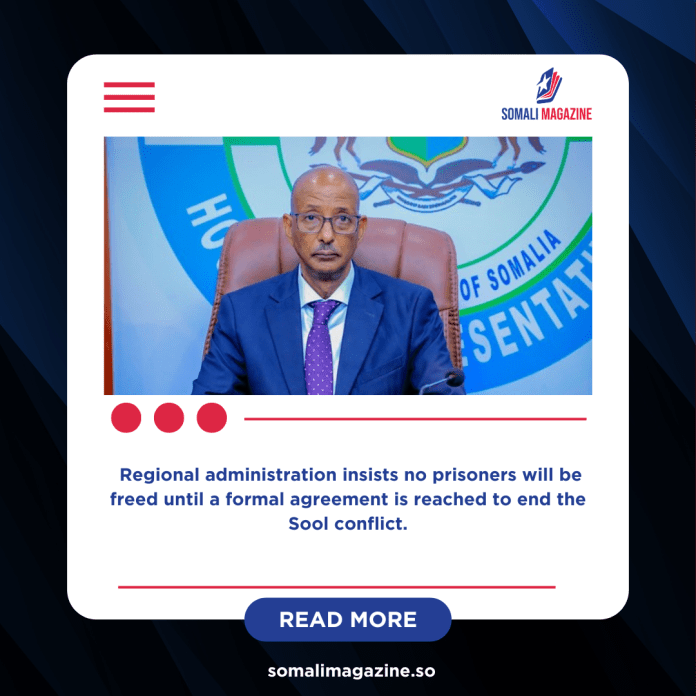Facebook Twitter (X) Instagram Somali Magazine - People's Magazine
The Northeastern Somali regional administration has announced that it will only release Somaliland army prisoners once a peace agreement is reached to end the ongoing conflict in the Sool region. Speaking on Wednesday, the Speaker of the Northeastern State Parliament, Dr. Aden Abdullahi, said that the administration cannot free the prisoners until both sides formally agree on a lasting solution to the clashes in Las Anod town.
Dr. Aden explained that many of the prisoners were detained for serious offenses, including crimes linked to the violence and displacement of residents in Las Anod. He emphasized that justice must take its course and that those found responsible for atrocities would face legal consequences. However, he added that if genuine peace talks begin and Somaliland agrees to a political settlement, the administration is prepared to release the prisoners as part of the reconciliation process.
“As long as Somaliland believes it can seize this land by force, there can be no exchange of prisoners,” Dr. Aden stated firmly. He said the region’s leadership is not opposed to dialogue but cannot overlook the suffering caused by the prolonged conflict, which has deeply affected the people of Las Anod.
Dr. Aden revealed that 25 prisoners had previously been released, although he claimed the administration did not fully understand the terms or benefits of that exchange. He expressed dissatisfaction with the fact that some detainees have been held for up to three years without progress toward peace, blaming Somaliland’s unwillingness to engage in meaningful negotiations. According to him, the delay in talks has made reconciliation and humanitarian efforts in the area more difficult.
The Speaker’s statement follows recent reports that Somali President Hassan Sheikh Mohamud has urged the Northeastern administration to transfer Somaliland prisoners to the Federal Government. The President reportedly believes that such a move would help build trust and pave the way for broader peace efforts. His call comes as part of renewed efforts by federal authorities to ease tensions between the two regions and foster national unity.
Earlier in July, Prime Minister Hamse Abdi Barre visited Las Anod to help mediate between the two sides. During that visit, he played a key role in overseeing the handover of 25 Somaliland soldiers who had been captured by the Northeastern administration. Those prisoners were later transferred to Somaliland authorities as a gesture aimed at reducing hostilities and encouraging dialogue.
Despite these developments, both sides have remained cautious. The Northeastern administration insists that any further prisoner releases must be tied to an official peace deal that guarantees the safety and stability of the Sool region. Meanwhile, Somaliland has not made a clear public statement on whether it is ready to resume negotiations.
Observers say that the ongoing standoff continues to strain relations and delay humanitarian assistance for displaced families in Las Anod. Many locals have called for stronger mediation efforts from the Federal Government and international partners to end the bloodshed and restore normalcy in the area.
President Hassan Sheikh has repeatedly stressed the importance of reconciliation, urging both administrations to put aside political differences and prioritize peace. His recent appeal for the release of all prisoners held by both sides is seen as a symbolic gesture to build confidence and open a path toward dialogue.
As tensions remain high, the Northeastern administration’s firm stance highlights the fragile nature of the peace process. Without mutual trust and concrete steps toward negotiation, the fate of many prisoners—and the stability of the Sool region—remains uncertain. For now, the release of Somaliland army captives depends entirely on whether both sides can agree to end their dispute through peaceful means.

